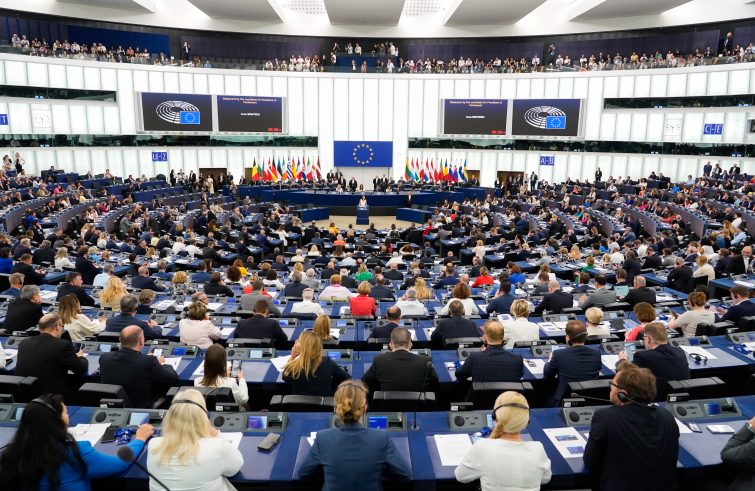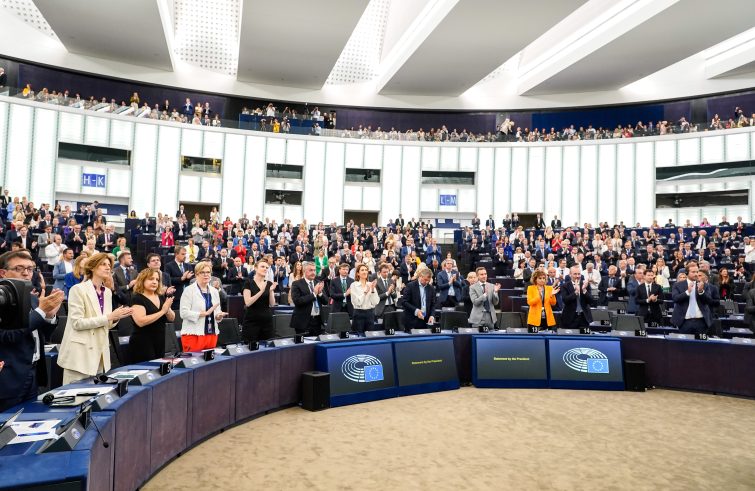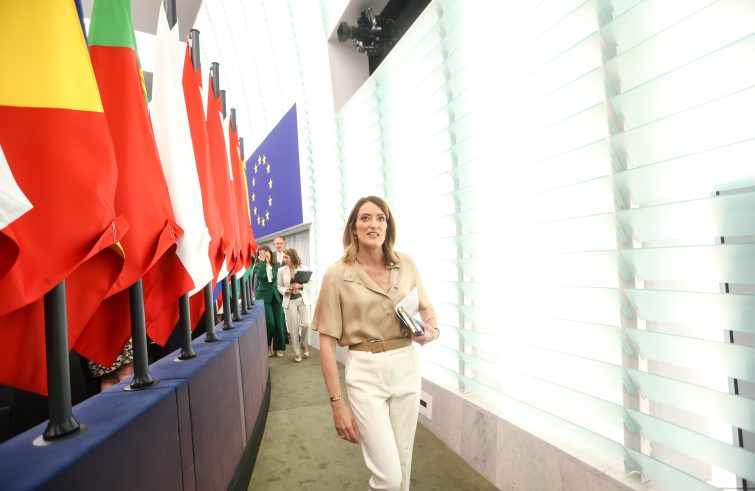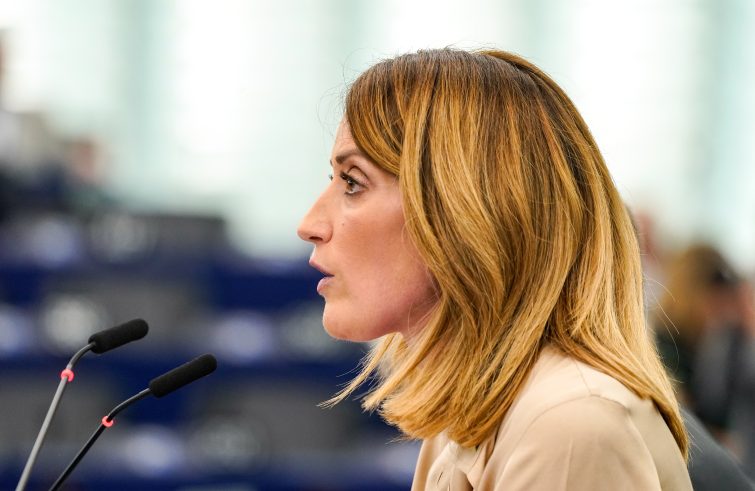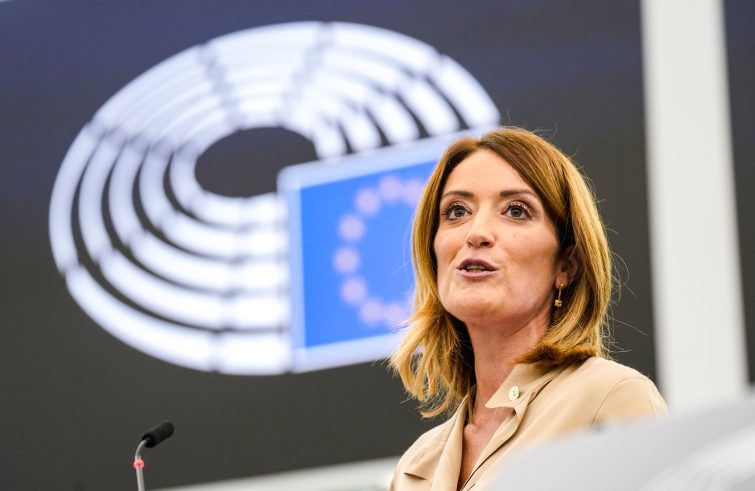
(Strasbourg) “A strong Parliament in a strong Europe.” It is the hope expressed by Roberta Metsola overwhelmingly re-elected President of the European Parliament, in her inaugural speech. The Maltese MEP, member of the People’s Party group, received an absolute majority of 562 votes out of 623 valid votes (699 voters, 76 blank and invalid votes). The Left-wing candidate, Irene Montero, received 61 votes.
A “Roberta majority”? Newly elected President Metsola made an ‘ecumenical’ speech in the Strasbourg hemicycle, acknowledging the large majority that had voted for her. Indeed, Metsola was able to count on the support of the People’s Party (188 seats), the Social Democrats (136) and the Renew liberal group (77), in addition to the Greens (53 votes). These four groups together make up 454 MEPs, which shows that Metsola received support from a much broader political spectrum, including conservatives and non-attached MEPs. The secret ballot does not allow for further analysis, but it’s safe to say that this pro-European ‘Roberta majority’ bodes well for Thursday’s vote, when MEPs will be asked to confirm Ursula von der Leyen’s second term as Commission President.
- (Foto Parlamento europeo)
- (Foto Parlamento europeo)
Democracy, social rights. Metsola touched on the various items on the EU’s agenda: institutional reforms (calling for Parliament to have the right of initiative in legislative matters, currently held by the Commission), support – including military support – for Ukraine, the defence of democracy (“we can never take it for granted”) and the rule of law. She recalled the EU’s due commitment to the preservation of peace (including in the Middle East) and social rights, the promotion of opportunities for young people, an environmentally sustainable free market economy. She highlighted the problem of housing costs, the need to invest in education and research and to engage in the digital age. She called for decent pensions and wages. On migration, while emphasising the path of an undefined “anthropocentric migration policy”, she seemed to rely on the modest, recently signed EU agreement.
Fathers and Mothers of Europe. Her speech was rich in quotations and references. First of all, she recalled her predecessor David Sassoli, who “put human dignity first.” Then the founding fathers, Pope Wojtyla, Simone Veil (first woman President of the European Parliament in 1979). “Ours” she said, “must be a Europe of which Adenauer, Mitterand, Wałęsa, Fenech Adami, Havel, Falcone, Borsellino would be proud’. She dedicated a passage of her speech, read in Italian, to a quote from Alcide De Gasperi: “The tendency to unite is a constant in history. We speak, we write, we insist, we do not pause for breath; may Europe remain the topic of the day.” She spoke at length about the commitment to combating violence against women and ensuring gender equality in all areas of life, citing Marie Skłodowska-Curie, Yulia Navalny and Daphne Caruana Galizia as examples.
- (Foto Parlamento europeo)
- (Foto Parlamento europeo)
History and hope. The inaugural speech moved from the lofty to the practical, including “legislative action for the common good”, she noted. “Together we must stand up for the politics of hope, for the dream that is Europe. […] Ours must be a Europe that remembers. That learns from past struggles and recognises the fight of so many who stood for the ideals we sometimes take for granted.” “Ours must be a Europe that honours our common history. And there is no better place than here in Strasbourg, in the seat of the European Parliament, in this living symbol of reconciliation, to remember the past and to build the future.”
Unity in diversity. She pointed to the “polarisation in our societies”, leading to “confrontational politics and even to political violence”. She denounced the “easy politics” of populism and those that “divide our communities into ‘us’ and ‘them’.” “This fuels anger and hatred rather than building hope and faith.” She reaffirmed the commitment to “making Europe truly equal for all”, not to homogenise people and territories, but to give “everyone the same chance to fulfil their potential. It is equality of opportunity that recognises our differences”, different cultures, different histories, different languages.
Europe “united in diversity”.
“Too many women…” In a programmatic key, she outlined the characteristics and the choices to be made “to leave Europe better than we found it”: Investing in security and defence, strengthening the single market and competitiveness, completing the banking and capital markets union, supporting industry and trade, cutting red tape, implementing the “social pillar”. Nor does she overlook the urgent need to “remove all barriers that prevent people with disabilities in our Union from having the same opportunities in life as everyone else”, to “fight discrimination and stem the rising tide of anti-Semitism or Islamophobia”. She denounced: “Too many women are still being abused, beaten and murdered in our Europe. Too many women are still fighting for their rights. Too many women still earn less than men for the same job. Too many women still live in fear. This must become their Europe too”.
“Don’t be afraid”. President Metsola thus shifted the focus to Ukraine (“defend peace and freedom”), the Middle East (“stop the violence, release the hostages, two peoples, two states”), Cyprus, half of which is occupied by the Turkish army. The gaze was raised to the world at large, to the conflicts that are still raging, to the injustices. “To renew our commitment to Europe, we must – in the words of that great European Saint from Krakow, Karol Wojtyła – ‘not be afraid’. We must not be afraid to confront the autocrats, to stand up for Europe, to continue building a Union that works for all of us.”
She concluded her speech with a thought for the “new generations of Europeans”, for the future, “because”, she said to the applause of MEPs, “Europe is hope.”

